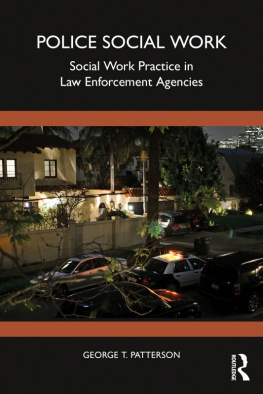Routledge Revivals
Psychiatric Social Work in Great Britain
Originally published in 1964 Psychiatric Social Work looks at psychiatric social work as an established form of professional social work in Great Britain, as well as the mental health policy introduced at the time of the books publication. The book looks at how social workers in the 1960s were striving for professional status, and the interest that grew around their professional status during this period. The book examines changes and issues in their training and a general picture of those who qualified. It looks at the careers of a group of social workers and follows the developments in child guidance, mental hospitals, and the care of the mentally ill in the community. The contribution of social workers is discussed and their activities of the professional associations in training and professional development is examined. This book will act as an important historical look at the changes to social work.
First published in 1981
by Routledge & Kegan Paul Limited
This edition first published in 2018 by Routledge
2 Park Square, Milton Park, Abingdon, Oxon, OX14 4RN and by Routledge
711 Third Avenue, New York, NY 10017
Routledge is an imprint of the Taylor & Francis Group, an informa business
1964 Noel Timms
All rights reserved. No part of this book may be reprinted or reproduced or utilised in any form or by any electronic, mechanical, or other means, now known or hereafter invented, including photocopying and recording, or in any information storage or retrieval system, without permission in writing from the publishers.
Publishers Note
The publisher has gone to great lengths to ensure the quality of this reprint but points out that some imperfections in the original copies may be apparent.
Disclaimer
The publisher has made every effort to trace copyright holders and welcomes correspondence from those they have been unable to contact.
ISBN 13: 978-1-138-37128-6 (hbk)
ISBN 13: 978-0-429-42768-8 (ebk)
PSYCHIATRIC SOCIAL WORK IN GREAT BRITAIN
(1939-1962)
by
NOEL TIMMS
First published 1964
by Routledge & Kegan Paul Limited
Broadway House 68-74 Carter Lane
London, E.C.4
Printed in Great Britain
by Charles Birchall & Sons Limited
Liverpool & London
Noel Timms 1964
No part of this book may be reproduced in any form without permission from the publisher, except for the quotation of brief passages in criticism
TABLES, FIGURES AND MAPS
CHAPTER THREE
CHAPTER FOUR
CHAPTER TEN
I AM grateful to the following for their informed and helpful criticisms: Miss Megan Browne, (Lecturer in Psychiatric Social Work, Edinburgh University), Mrs. Elizabeth Irvine (Senior Tutor, Tavistock Clinic), Mrs. Kay McDougall (Senior Lecturer in Social Work Education, London School of Economics) and Professor David Donnison. In acknowledging the benefits of their considered judgments I would like to exonerate them from any identification with the opinions I have expressed.
The Association of Psychiatric Social Workers has generously allowed me access to their records for the purpose of this study and I would like also to record useful and pleasant conversations with the late Margaret Ashdown, Miss Elizabeth Howarth and Miss Noel Hunnybun. Many other psychiatric social workers have discussed their work in child guidance clinics, mental hospitals and community care with me and I am particularly grateful to the Director and staff of the clinic studied in . Finally, I would like to thank Mr. Edward James for his help with the statistical analysis of some of the material.
What happens when half-baked social workers half-trained in analytical techniques apply them indiscriminately in the delicate task of social guidance can best be left to the imagination.
THE object of this book is to study a particular group of social workers, those trained as psychiatric social workers. It was begun in the belief that their work should not be left to the imagination and that an accurate factual picture of their training, practice, professional activities, research and writing would inform and clarify. It has been designed to answer certain questions: who are psychiatric social workers? What do they do? Are they half-baked or adequately trained? How has psychiatric social work been moulded? What attitudes do psychiatric social workers have towards other forms of social work and to what extent have these attitudes (conditioned by the setting of psychiatric social work) set the tone for social work in other settings for which they may or may not be appropriate?
Psychiatric social work, as we shall see later in this chapter, can be variously defined, but any of the possible interpretations of the term refer to a specialization within the wider field of social work. Its significance can perhaps be most easily appreciated against this general background. Attempts to define social work, however, have met with little success. This is so whatever the nature of the attempt; whether it has been to convey the essence of the activity or to denote what people who were called, or called themselves, social workers actually did; or even to decide to whom the title could properly be given. Social work has changed as society and our social knowledge have changed; it has been transformed because the social agencies from which it is practised (hospitals, local authorities, voluntary societies) have modified their original aims and conceptions. Some of the agencies have been unable to adapt to change and have ceased to exist; new agencies have been created to meet freshly appreciated needs, sometimes in novel ways. Thus, because social work is the product of many changing forces, a historical approach provides the most serviceable approach to understanding its operations. This has the additional advantage of enabling us to judge the impact of the new psychiatric specialization that first appeared in Britain around 1930.
Social work covers a wide range of activity which overlaps with ordinary neighbourliness at one end and psychotherapy at the other. Its origins as a separate and specialist series of activities can be found in the general changes brought about by the Industrial Revolution and, more particularly, in the response of certain philanthropists to conditions in the middle decades of the last century. Of special importance are the principles and procedures involved in the first forty years of the life of the Charity Organisation Society. It is these that most clearly show the gradual emergence of a new social role, that of the informed and professional friend, whose activity was different from that of the squire, clergyman or usual family friend. The aims of such agencies as the C.O.S. were often couched in terms of offering a helping relationship to assist the person or family in trouble in solving problems of everyday living (to find a job, a home etc.), but actual decisions more often than not revolved around granting or withholding material relief. For the majority of the destitute, however, recourse was usually to the statutory Poor Law Service. Until its abolition in 1948 this service was unaffected by the principles of social work as evolved by the voluntary bodies in the late nineteenth and early twentieth centuries. It is important to appreciate that theorizing about social work flourished initially under special circumstances. It developed in voluntary (i.e. non-statutory) bodies, such as Settlements and Charitable agencies, who had no responsibility for ensuring a uniform and general service. These agencies were often small and their primary discipline and purpose was that of social work. Not all voluntary agencies, however, were influenced by the main stream of social work. Probation officers who were in the first two or three decades of this century drawn predominantly from religious and social organizations, preferred to define themselves as court missionaries or court officers rather than social workers.









